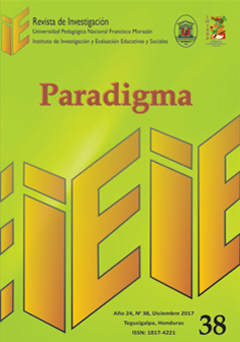Social justice in the analysis of educational policies: a look from the work of Stephen Ball
DOI:
https://doi.org/10.5377/paradigma.v24i38.6775Keywords:
educational policy, social justice, the State, neoliberalism and educational reformAbstract
This article analyzes Stephen Ball’s perspective on social justice in the study of educational policies related to: micro-politics, choice of school by parents, neoliberalism, role of the state, philanthropy, educational reforms, its impact on school life and its constant interpretation by the different educational actors.
The notion of social justice in Ball’s writings on educational policies is characterized by the search for mechanisms that allow empowering an educator, an institution or region so that it can reach an acceptable level of development, its vision is identified with a broad vision on the problems of equality and social equity in the school and its social context, the inequalities in school access, the social inclusion of historically marginalized sectors and the reduction of social gaps, among others.
It also traces the change of the idea of education as a public value to one centered on the market, referred to by Stephen Ball as excluding, by characterizing strategies that privatize public education.
Downloads
816
Downloads
Published
How to Cite
Issue
Section
License
Transfer of Copyright
- The author, when sending the work, states that it is his will to give the Universidad Pedagógica Nacional Francisco Morazán the patrimonial rights that correspond to him as the author of his work.
- The rights here assigned include all economic rights (Reproduction, transformation, public communication and distribution) and are given without limitation in terms of territory; This Assignment is given for the entire duration term established in the current legislation in Honduras.
- The cession of the aforementioned rights does not imply the cession of moral rights over it, because in accordance with the provisions of the Copyright and Related Rights Law, Chapter II, of the Moral Rights, Article 34, Article 25 , these rights are inalienable, imprescriptible, indefeasible and inalienable.
- The research work or document must be original and have been done without violating or usurping rights of third parties, therefore, the work is exclusively authored and owns the same.
- In the case of any claim or action by a third party, as to copyright on the work in question, the author must assume full responsibility for the rights assigned.
- Upon completion of the Rights Assignment Form, the author states that the work has not been published in another way, that the rights on the work have not been assigned and that no encumbrance or limitation on their use or use is imposed on them.





